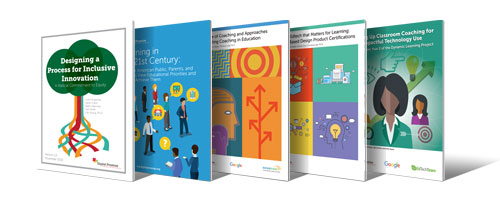Digital Promise Reports and Publications
Permanent URI for this community

Browse
Browsing Digital Promise Reports and Publications by Author "Baker, Anthony"
Now showing 1 - 4 of 4
Results Per Page
Sort Options
Item Feedback Loops: Mapping Transformative Interactions in Education Innovation(Digital Promise, 2022-05) Baker, Anthony; Weisgrau, Josh; Brister Philyaw, KristalThis report details the feedback loops initiative at Digital Promise in which we evaluated and mapped the way we generate insights and knowledge and the ways in which our partners contribute, perceive, and share in that process. In particular, we are interested in how we can create new processes we call feedback loops that can aid us in including our partners in more meaningful collaborations, developing solutions that are better targeted to the audiences they are intended for, and elevating the voices, needs, and excellence of the members of school communities. We believe there are cases where feedback loops will provide superior outcomes compared to traditional methods of feedback, and we detail in this report our conception of feedback loops, their components, and places within the Digital Promise ecosystem where they are currently in use, as well as provide guidance for others wishing to carry out this work.Item A Field-Driven, Equity-Centered Research Agenda for OpenSciEd: Updated Version(Digital Promise, 2022-03) McElhaney, Kevin; Baker, Anthony; Kasad, Zareen; Roschelle, Jeremy; Chillmon, CarlyIn order to catalyze the research community around OpenSciEd, Digital Promise, with support from the Carnegie Corporation of New York, has developed the OpenSciEd Research Agenda. Early on, we determined that three broad relationships between OpenSciEd and a research community could be fruitful. OpenSciEd enabled research encompasses questions in science education and beyond that can be best answered using OpenSciEd. OpenSciEd inspired research aims to drive innovations based on OpenSciEd’s distinctive features and affordances. OpenSciEd partnership research would address questions of mutual interest to researchers and OpenSciEd developers. This paper details the processes utilized to frame the research agenda, recruit stakeholders and engage them in activities to generate research questions, and identify emergent themes for future OpenSciEd research.Item An Initial Logic Model to Guide OpenSciEd Research: Updated Version(Digital Promise, 2022-03) McElhaney, Kevin; Baker, Anthony; Chillmon, Carly; Kasad, Zareen; Liberman, Babe; Roschelle, JeremyThis white paper supports an ongoing effort to define a research agenda and catalyze a research community around the OpenSciEd curriculum materials. Rigorous research on these materials is needed in order to answer questions about the equitable design of instructional materials, impacts on student learning, effective and equitable classroom teaching practices, teacher professional development approaches, and models for school adoption that address the diverse needs of historically marginalized students in STEM. Research findings have the potential to advance the knowledge, skills, and practices that will promote key student, teacher, and system outcomes. The research agenda stands to accelerate the research timeline and stimulate a broad range of research projects addressing these critical needs. To support the collaborative development and activation of the research agenda, we outline an initial logic model for OpenSciEd. The logic model can shape research efforts by clarifying intended relationships among (1) the principles, commitments, and key affordances of OpenSciEd; (2) the components of OpenSciEd and how they are implemented and supported in classrooms, schools, districts, and states; and (3) the desired outcomes of OpenSciEd.Item A Summary and Synthesis of Initial OpenSciEd Research(Digital Promise, 2023-03) McElhaney, Kevin; Mills, Kelly; Kamdar, Danae; Baker, Anthony; Roschelle, Jeremy;This report summarizes and synthesizes OpenSciEd research published as of August 2022, addressing two questions about OpenSciEd: (1) To what extent do teachers enact OpenSciEd units with integrity to its distinctive principles? and (2) To what extent do OpenSciEd teacher tools and professional learning experiences support teachers to enact OpenSciEd with integrity? This review includes 16 publications (journal articles, peer-reviewed conference proceedings, conference papers, doctoral dissertations, and published reports). Five of the papers focus on the design of OpenSciEd materials and do not have an empirical focus, seven have an empirical focus on classroom enactment, and four have an empirical focus on teacher supports. All but one of the papers were co-authored by affiliates of the OpenSciEd middle school development consortium, and all but one focus on the middle school grade band.